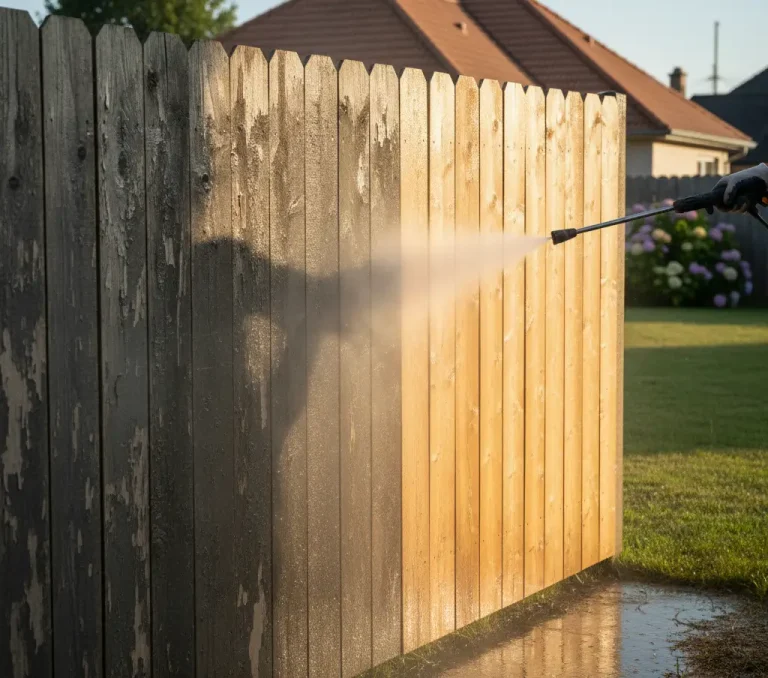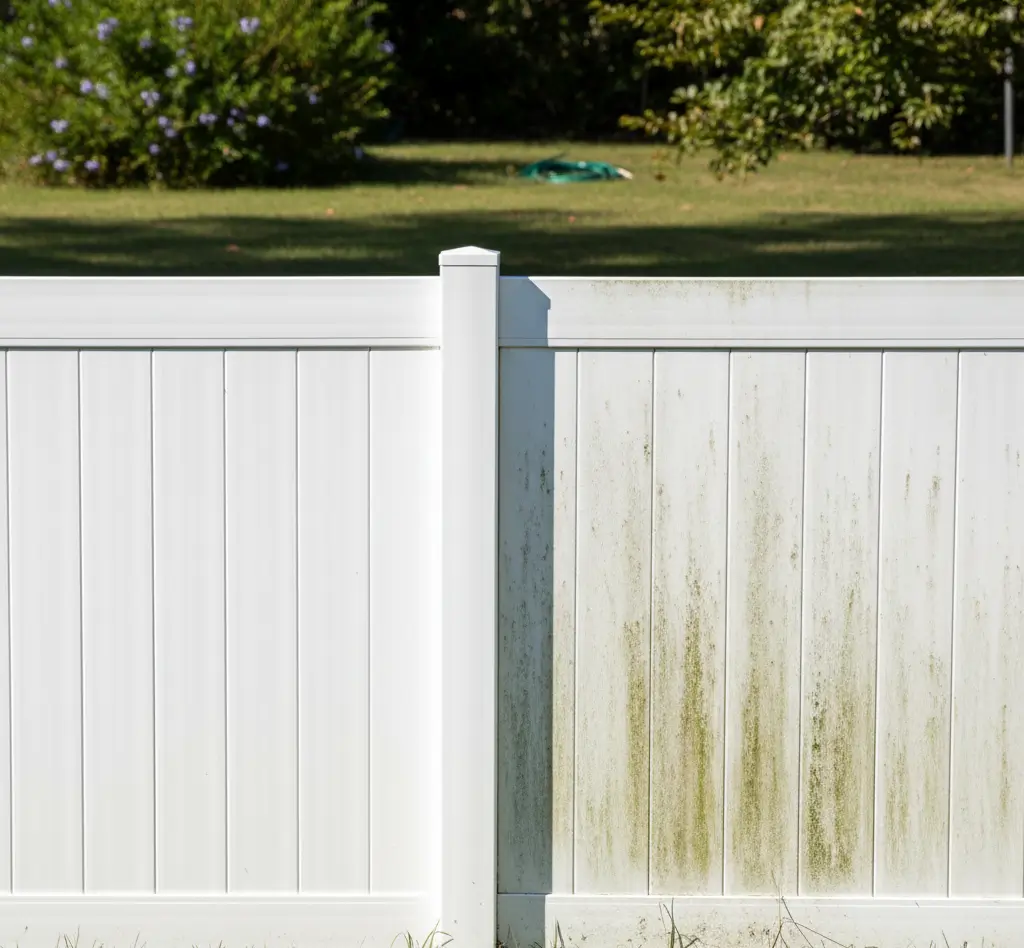Fence Washing in Folsom, CA: Pressure Washing for Every Fence Type

Wood, vinyl, and composite fences collect dirt and algae that break down protective finishes.
Regular washing removes buildup before it causes rot or discoloration.
Most Folsom homeowners schedule fence cleaning in spring or fall, when temperatures stay mild and surfaces dry quickly.
Our team cleans fences in neighborhoods like Empire Ranch and Parkway Oaks using soft washing or low-pressure methods that protect wood grain and finish.
Clean fences improve curb appeal and extend the life of your investment.
Pressure Washing Removes Algae and Mildew That Damage Folsom Fences
Algae and mildew grow where moisture collects on fence surfaces. Sprinkler overspray in neighborhoods like Oak Avenue Parkway creates damp conditions that encourage green streaks and black spots.
These organisms feed on wood and vinyl, weakening materials over time. Left untreated, algae works into wood grain and loosens fasteners. Mildew spreads quickly in shaded areas where fences stay damp longer.
Professional fence washing kills spores at the root. We apply cleaning solutions that break down organic growth, then rinse surfaces clean. The process removes visible stains and prevents regrowth for months.
Folsom’s low humidity means most algae only grows in specific zones. Targeted cleaning in those areas costs less than treating an entire fence line. Regular washing stops damage before it requires board replacement or structural repairs.
We Understand the Challenge of Weathered Fences in Folsom
Consistent 5-Star Reputation
Folsom homeowners trust Wash Works for reliable, detailed fence washing that restores color and boosts curb appeal, our flawless reviews speak for themselves.
Licensed & Insured Experts
Every technician is trained, insured, and dedicated to providing safe, professional fence cleaning that revives your property and extends the life of your fencing.
Soft Washing Protects Wood Fences Better Than High-Pressure Methods
High-pressure washing can splinter wood and strip protective finishes. Cedar and redwood fences in Folsom Ranch need gentler treatment to avoid grain damage. Soft washing uses cleaning agents and low PSI to lift dirt without harming wood fibers. The solution does the work, not the pressure. This method cleans deeply while preserving the natural texture of your fence.
Wood responds well to controlled washing. We adjust pressure based on wood type and fence condition. Older fences with weathered boards require extra care. Soft washing removes years of buildup without creating new problems. The process leaves surfaces clean and ready for stain or sealer application.
Folsom’s dry summer heat helps fences dry quickly after washing. Most wood fences are ready for staining within 24 to 48 hours. This quick turnaround lets you complete your fence maintenance in one weekend. Soft washing protects your investment while delivering the clean appearance you want.
Three Easy Steps to a Cleaner Fence
Get Your Free Quote
Tell us about your fence and get a fast, accurate estimate in minutes.
Schedule a Cleaning
Choose a time that fits your day and we will handle the rest with professional care.
Relax While We Work
Watch your fence regain its color and cleanliness while you sit back and enjoy the results.
Fence Washing in Folsom Prepares Surfaces for Staining and Sealing
Stain and sealer only bond properly to clean wood. Dust, old finish residue, and oxidation block penetration and cause premature peeling. Washing before staining opens wood pores and creates the right surface for absorption. Spring and fall offer ideal conditions for fence restoration projects in Folsom. Mild temperatures and low humidity help new coats cure evenly.
Our washing process removes everything that prevents proper adhesion. We clear away dirt, failed stain, and weathered wood fibers. The result is a clean surface that accepts new finish like it should. Skipping this step leads to poor coverage and wasted materials. Properly cleaned fences hold stain longer and look better from the first application.
Folsom’s intense UV exposure fades exterior finishes faster than in coastal areas. The sun breaks down stain within two to three years on south-facing fences. Clean preparation extends finish life by one to two years. That extra time saves money on materials and labor. Starting with a clean fence gives you better results and longer protection.
Professional Cleaning Restores Older Fences Without Replacement Costs
Fences that look gray and weathered often have solid bones underneath. Dirt buildup, black streaks, and oxidation hide the natural wood color.
Professional washing reveals the original tone and grain pattern. Many Folsom homeowners avoid replacement costs by restoring instead of rebuilding.
Folsom’s dry climate prevents the deep rot common in humid regions. Wood stays stable even when it looks rough.
Most older fences only need surface cleaning to regain appearance. Cleaning costs a fraction of fence replacement and delivers immediate visual impact.

Regular Fence Washing Prevents Rot in Folsom's Hot, Dry Climate
Dust and organic debris trap moisture against wood surfaces. Even in dry climates, trapped moisture creates conditions for rot to start. Property owners in East Folsom who schedule annual cleaning remove contaminants before they break down protective finishes. Consistent maintenance catches problems early and extends fence lifespan by years.
Folsom’s minimal rain means dirt stays on surfaces longer than in wetter regions. Wind-blown dust from construction and agriculture settles into wood grain. This buildup holds moisture from sprinklers and morning dew. Regular washing clears these particles and lets wood breathe. Clean fences shed water naturally and resist decay.
Annual cleaning also gives you a chance to inspect your fence closely. We spot loose boards, failing fasteners, and finish wear during the washing process. Small repairs cost less when you catch them early. Proactive cleaning protects your investment and keeps your fence looking good year after year.
Frequently Asked Questions
Should you pressure wash fences before staining in Folsom?
Yes, washing removes dirt, old finish, and oxidation so new stain penetrates evenly and bonds properly. Clean wood accepts sealer better and holds the finish longer. Skipping this step leads to poor adhesion and premature peeling. Professional washing prepares surfaces correctly and helps your stain job last one to two years longer in Folsom’s intense sun.
How long does a fence need to dry after washing in Folsom?
Most fences dry within 24 to 48 hours in Folsom’s low humidity and warm temperatures. Wood type and shade affect drying time. Cedar and redwood dry faster than pressure-treated lumber. South-facing fences in full sun dry quickest. Check that wood feels dry to the touch before applying stain or sealer for best results.
Will pressure washing damage my wood fence in Folsom?
Soft washing or controlled low PSI (under 1500) cleans wood safely without splintering or stripping grain. High pressure damages wood by forcing water deep into fibers and removing protective layers. Professional cleaners adjust pressure based on wood type and fence condition. Professional external-cleaning guides show soft washing is especially effective at removing algae and mildew from wood fences without damage. Proper technique removes dirt while preserving the wood’s natural structure and finish.
How do I remove green algae from my fence in Folsom?
Professional washing uses algaecide solution and controlled pressure to kill and rinse away growth. The cleaning agent breaks down algae at the root, preventing quick regrowth. DIY methods with bleach can damage wood and landscaping. Our process targets algae in shaded or irrigated zones where moisture encourages growth, leaving your fence clean and protected.
Can fence washing remove black mildew stains in Folsom?
Yes, cleaning agents break down mildew before rinsing, restoring wood to its original color. Black stains come from mildew feeding on wood sugars and organic matter. Professional solutions penetrate deeply to eliminate growth and remove discoloration. The process works on most wood types including cedar, redwood, and pine. Results depend on how long mildew has been present.
How often should I wash my fence in Folsom?
Annual cleaning prevents buildup in dusty areas and protects wood from long-term damage. Fences in shaded spots or near sprinklers may need service twice yearly due to increased algae and mildew growth. Regular washing extends fence life and maintains appearance. Schedule cleaning in spring or fall when temperatures stay mild and wood dries quickly for best results.

